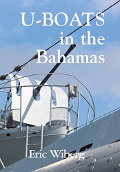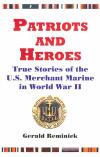Wolfpack
Poolman, Kenneth
1959, Corgi [Transworld Publishers]
Paperback, 156 pages
| Type. | Novelisation of movie |
| Pros. | Good title for a rare Atlantic-campaign submarine movie |
| Cons. | Cliched, inaccurate, implausible, full of holes |
| Rating. |  |
U-Web Review: Wolfpack 1959 Corgi [Transworld Publishers], paperback, 156 pages. Novelisation - Kenneth Poolman from John Manchip White’s screenplay: “the breathtaking book of the British Lion film.” Pro: Good title for a rare Atlantic-campaign submarine movie. Con: Cliched, inaccurate, implausible, full of holes: 1 out of 5.
Novels or ‘novelisations’ of movies are always a mixed bag. Submarine movies are no exception. Almost always accuracy and authenticity are subsumed to storytelling, actual events are ditched for action-drama which can safely be made bigger, better, more exciting, without upsetting anyone ‘who was there’. That was important in 1959, only 14 years ‘after’.
Novelisations are as short and ephemeral as the movies they “boost”. Novelisations are not literature, novels, or even pure entertainment. They are promo tools, like posters, uniforms, exhibits. They were important promos even 50 years ago, when there were no TV rights, no video releases, no game or fast-food tie-ins; much less advertising machinery. In those days movie re-enactments of famous events roped in survivors, eyewitnesses and recruitment officers, not just uniforms. They are commercial, in a way that only the most cliched bestseller horror, fantasy or thriller novels are.
Novelisations are dying: killed off by websites, by video, DVD and computer games allowing us to relive the experience differently. Few want to ‘read’ the movie. All this was impossible before films were broadcast on TV.
Adapting a novel into a movie has been described as “boiling an ox to make a stockcube”. The average genre novel today is 80-120,000 words, while the average hour and a half action screenplay is only 5,000 words or so. The opposite is true of novelisations: more must be borrowed, pinched or invented to fill empty pages between description, dialogue and action: all the stuff the screen communicates to the eye.
Producers often depend on famous authors to write ‘novelisations’. They rely on ease with cool-sounding sci-fi lingo or techno-gobbledegook. Writers depend on producers: it is quick - someone already wrote it - easy money [compared to an entire novel without an advance] and often a good feather in your cap. “I did this fast, which you know was a hit, so please let me take a risk with your money instead.”
Less often producers want a writer’s familiarity with the forms and devices of the genre: giving an ignorant screenwriter’s material credibility or depth, or to conceal the action-over-accuracy demands of producer, studio, or both. More than a thin soup of the script should be made with the stock-cube they are given. It doesn’t matter, if book covers and magazine covers can be on shelves early enough for people to connect the title with the movie, and buy both. Poolman did this as well as any of his other projects: technical, personal, or operational histories, his own limited range of novels, and limited range within them.
Wolfpack is a typically deceptive title: you might expect a mighty battle, a boots’n’all picture of a poorly-escorted convoy defended from menacing Jerry subs. Something accurate never made before or since: better than the shipping scenes hinted at in Enigma, or the attacks nearly seen in Cruel Sea and Das Boot. Wolfpack disappoints - merely another improbable captured U-Boat secret-mission yarn.
It resembles Enemy Below, a good movie from a good novel, losing something in the adaptation. It was a novel turned into a film with more than enough meat for the story. It was reworked from an RN one by an American studio with an American ship, crew and cast. A USN destroyer hunted and rammed a U-Boat in central Atlantic until both were lost. It was hopelessly, amusingly romantic: no merchant shipping to muddy the morals, men on both sides honourable. Enemy Below also retold that other great American maritime tale, Moby Dick: the obsessive chase and kill destroying hunter and hunted. Ironically the actual, historic events were American: USS Borie and two U-Boats, USS Buckley vs U-66. Wolfpack has no such refinements or romanticisations: the British Atlantic campaign had other, harsher connotations.
Wolfpack was also reworked many years later by Poolman [Decoy, anyone?] with even more improbabilities. It commences in Nov 1942, with U-227 sinking RN destroyer Wenvoe and, of course, U-Boat men machine-gunning survivors struggling in the water. U-227 is depthcharged, surfaces, abandoned by panicked crewmen - the officers die attempting to scuttle - and captured. We cut to ace RN submarine crewmen on leave, in the typical railway carriage scene; bizarrely blending In Which We Serve with Harry Potter’s Hogwart’s Express. These are as familiar as Jerries shooting jack tars in the water. They are the usual mix of career and reserve officers, and the usual cross-regional ratings - ‘Brummies’, Scots, Geordies, Scouses, men from Pompey and Guzz, an inevitable upper-middle-class cultured rating, who has memorised Jeeves, presumably so he can recite it to the others in the boring bits between the depthcharging. We cut to the RN sub’s incredulous German-speaking CO being briefed to take a captured U-Boat to the Azores to rendezvous for a wolfpack attack, presumably on a Sierra Leone convoy. Writers always carefully give a fake designation.
Implausibilities soon overwhelm plot and characters. Why not send an RN sub, now you have the codes to rendezvous submerged? This wolfpack is led by a senior submariner from a U-Boat, not centrally by BdU in St Nazaire or Paris...like a flotilla or escort commander, starkly defying fact. There is no time to teach RN submariners the sophisticated U-Boat fire control system. The only diesel-electric man they could find in a hurry is a fiercely neutral Irish engineer. This is not nitpicking plot holes or details. How much incoherence and unworkable convenience should the audience be forced to put up with?
Once U-227 rendezvous with the ‘real’ U-Boats she transmits their position, attacks, and draws in a Western Approaches Command escort group to sink them - without radar, HF/DF or hedgehog, only guns and DCs. Amusingly, U-Boat-HQ worries about operating in US territorial waters 11 months after America entered the War. Where do the rest of the wolfpack go, so only the leader hunts U-227? This is good action plotting, but again, defies reality. Was there a Malta-based destroyer flotilla in Nov 1942? Or were these just left over from an earlier script set in the Med - like U-571?
These are brand new fleet destroyers, not proper ASW vessels, some with brand-new untested RNVR captains - but how did they acquire their impressive U-Boat hunting records? Other captains are aces with several kills each...when hardly any ASW vessels had sunk U-Boats at all. RNVR officers question and flaunt orders to sink all U-Boats despite signals that U-227 is British-manned, exactly the way real ones wouldn't. Damaged and bottomed in 200 ft off the Azores, U-227’s British crew are told to get rid of their stolen Nazi uniforms and emblems in case they are captured by either side - how?! Through torpedo tubes? The toilet?! Destroyers’ propellors hunting overhead make a deep rumble, not a high whine. Manchip White has heard engines on a ship but not from a submarine. He has no idea of the constraints or problems of flushing a toilet at depth. No-one bothered to ask an adviser what it’s really like. Novelisation and movie end with two pages of destroyers lowering boats to rescue survivors - all U-227’s crew! One captain nearly cracked and shot them all - he was the father of Wenvoe’s CO killed at the beginning.
You could be forgiven for dismissing all this as “what rot”, and I don't blame you. It may have made a good yarn once, though credibly it compared badly with Cruel Sea or Enemy Below, and even with stiffer reenactments like Above Us the Waves or The Gift Horse. Wolfpack may have even made a profit, as intended. Otherwise it did both personnel of all sides, and the audience as much a disservice as any modern movie loaded with such inaccuracies and implausibilities. Only for film students and serial masochists.
The reviewer welcomes your comments on this review.
Review written by Ian Campbell, Launceston, Tasmania.
Published on 9 Aug 2004.
Return to our main review page.



